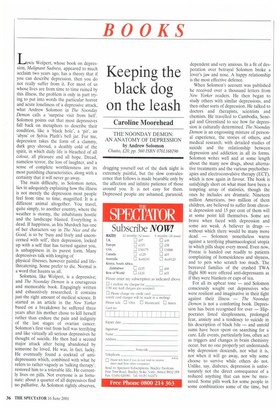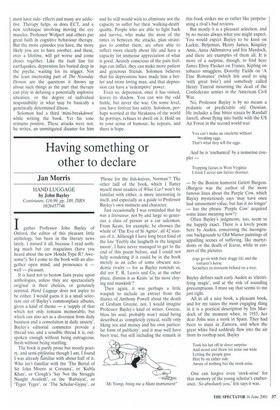Keeping the black dog on the leash
Caroline Moorehead
THE NOONDAY DEMON: AN ANATOMY OF DEPRESSION by Andrew Solomon Chatto, £20, pp. 560 ISBN 0701168196 Lewis Wolpert, whose book on depression, Malignant Sadness, appeared to much acclaim two years ago, has a theory that if you can describe depression, then you do not really suffer from it. For most of us whose lives are from time to time ruined by this illness, the problem is only in part trying to put into words the particular horror and acute loneliness of a depressive attack, what Andrew Solomon in The Noonday Demon calls a 'surprise visit from hell'. Solomon points out that most depressives fall back on metaphors to describe their condition, like a 'black hole', a 'pit', an 'abyss' or Sylvia Plath's bell jar. For me, depression takes the form of a clammy, dark grey shroud, a deathly cold of the spirit, in which daily life is bleached of all colour, all pleasure and all hope. Dread, nameless terror, the loss of laughter, and a sense of complete worthlessness are its most punishing characteristics, along with a certainty that it will never go away.
The main difficulty, as Solomon notes, lies in adequately explaining how the illness is not merely the depression most people feel from time to time, magnified. It is a different animal altogether. You travel, quite simply, to another country, where the weather is stormy, the inhabitants hostile and the landscape blasted. Everything is dead. If happiness, as Iris Murdoch has one of her characters say in The Nice and the Good, is to be 'busy and lively and unconcerned with self, then depression, locked up with a self that has turned against you, is unhappiness in its purest form. Many depressives talk with longing of
physical illnesses, however painful and lifethreatening. Some prefer to die. Normal is a word that haunts us all.
Solomon, like Wolpert, is a depressive; and The Noonday Demon is a courageous and memorable book. Engagingly written and exhaustively researched, it contains just the right amount of medical science. It started as an article in the New Yorker based on a breakdown he suffered three years after his mother chose to kill herself rather than endure the pain and indignity of the last stages of ovarian cancer. Solomon's first visit from hell was terrifying and like virtually all serious depressives he thought of suicide. He then had a second major attack after being abandoned by someone he loved. He was, in fact, lucky. He eventually found a cocktail of antidepressants which, combined with what he refers to rather vaguely as 'talking therapy', restored him to a tolerable life. He currently lives on pills. Not everyone is as fortunate: about a quarter of all depressives find no palliative. As Solomon rightly observes,
dragging yourself out of the dark night is extremely painful, but the slow convalescence that follows is made bearable only by the affection and infinite patience of those around you. It is not easy for them. Depressed people are ashamed, paranoid, dependent and very anxious. In a fit of desperation over betrayal Solomon broke a lover's jaw and nose. A happy relationship is the most effective defence.
When Solomon's account was published he received over a thousand letters from New Yorker readers. He then began to study others with similar depressions, and then other sorts of depression. He talked to doctors and therapists, scientists and chemists. He travelled to Cambodia, Senegal and Greenland to see how far depression is culturally determined. The Noonday Demon is an engrossing mixture of personal experience, the stories of others, and medical research, with detailed studies of suicide and the relationship between depression and addiction in all its forms. Solomon writes well and at some length about the many new drugs, about alternative treatments and the various psychotherapies and electroconvulsive therapy (ECT), which is now again in favour. The book is satisfyingly short on what must have been a tempting array of statistics, though the ones he includes are dramatic. Nineteen million Americans, two million of them children, are believed to suffer from chronic depression and 15 per cent of them will at some point kill themselves. Some are brave when faced with depression and some are weak. A believer in drugs — without which there would be many more dead — Solomon nonetheless warns against a terrifying pharmacological utopia in which pills shape every mood. Even now, Prozac is handed out readily to patients complaining of homesickness and shyness, and to pets who scratch too much. The bereaved families of the crashed TWA flight 800 were offered anti-depressants as if they were blankets or cups of tea.
For all its upbeat tone — and Solomon consciously sought out depressives who were resilient and imaginative in their fight against their illness — The Noonday Demon is not a comforting book. Depression has been recognised for ever — Hippocrates listed sleeplessness, prolonged fear, anxiety and a tendency to suicide in his description of black bile — and untold sums have been spent on searching for a cure. Life events, particularly loss, often act as triggers and changes in brain chemistry occur, but no one properly yet understands why depression descends, nor what it is, nor when it will go away, nor why some choose to survive while others do not. Unlike, say, diabetes, depression is unfortunately not the direct consequence of a reduced anything that can now be measured. Some pills work for some people in some combinations some of the time, but
most have sideeffects and many are addictive. Therapy helps, as does ECT, and a new technique involving moving the eye muscles. Professor Wolpert and others put great faith in cognitive behaviour therapy. But the more episodes you have, the more likely you are to have another, and these, over a lifetime, will get worse and come closer together. Like the fault line for earthquakes, depression lies buried deep in the psyche, waiting for its trigger. Not the least interesting part of The Noonday Demon are the questions it throws up about such things as the part that therapy can play in defusing a potentially explosive situation, or the degree of individual responsibility in what may be basically a genetically determined illness.
Solomon had a third 'mini-breakdown' while writing the book. Yet his tone remains positive. These attacks were not, he writes, an unmitigated disaster for him and he still would wish to eliminate not the capacity to suffer but their 'walking-death' quality. People who are able to fight back and survive, who make the most of the times in between the attacks, plan strategies to combat them, are often able to reflect more clearly about life and have a capacity for immense appreciation of what is good. Acutely conscious of the pain feelings can inflict, they can make more patient and generous friends. Solomon believes that his depressions have made him a better and more loving man, and that depression can have a 'redemptive' power.
Even so, depression, once it has visited, leaves its shadow. You can win the odd battle, but never the war. On some level, you have forever lost safety. Solomon, perhaps worried at the bleakness of the world he portrays, refuses to dwell on it. Hold on to your sense of humour, he repeats, and there is hope. this book strikes me as rather like perpetuating a rival's bad reviews.
But mostly it is a pleasant selection, and by no means always what you might expect. You would expect Bayley to be keen on Larkin, Betjeman, Henry James, Kingsley Amis, Anna Akhmatova and Iris Murdoch, and there are examples of them all. It is more of a surprise, though, to find here James Elroy Flecker on France, Kipling on tobacco smugglers, Dorothy Fields on 'A Fine Romance' (which Iris used to sing 'with great brio') and somebody called Henry Timrod mourning the dead of the Confederate armies in the American Civil War.
No, Professor Bayley is by no means a pedantic or predictable old Oxonian. He includes a fine bitter stanza by Randall Jarrell, about flying into battle with the US Air Force in the second world war:



































































 Previous page
Previous page